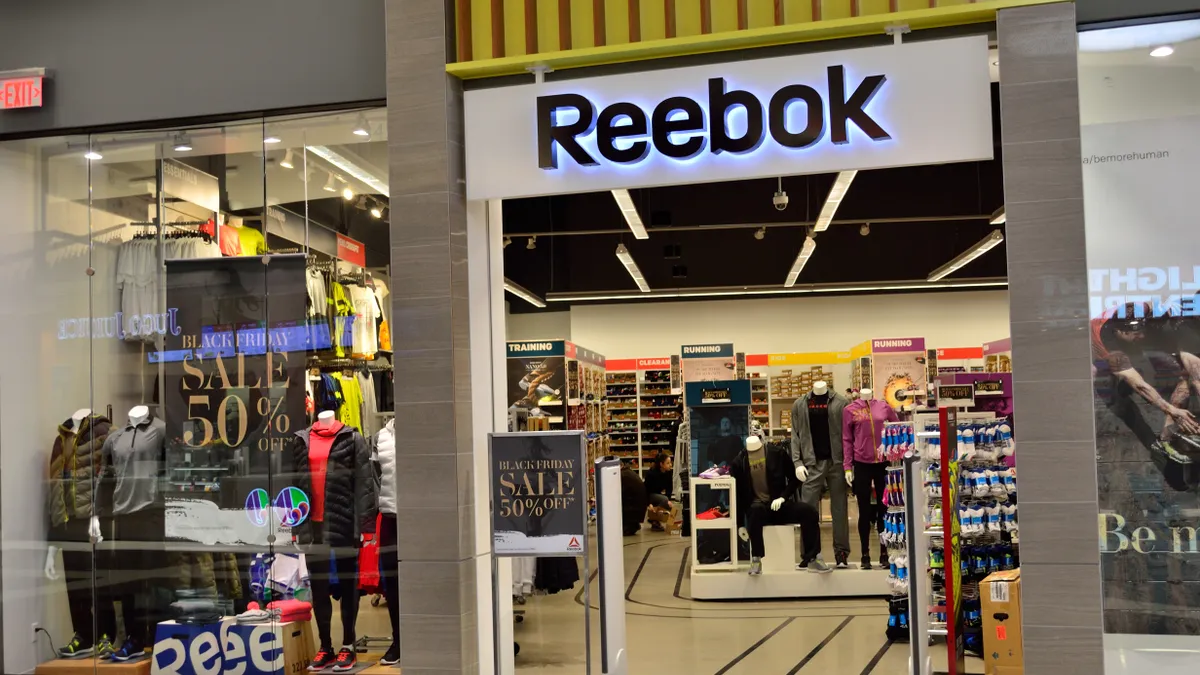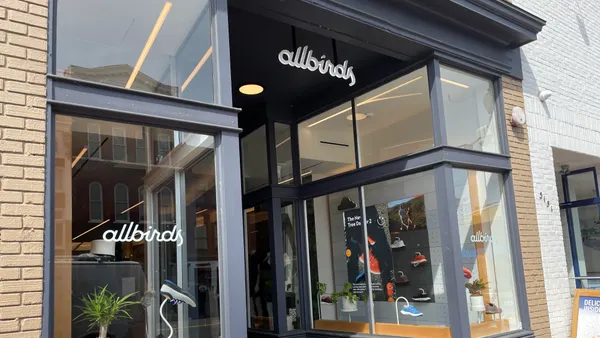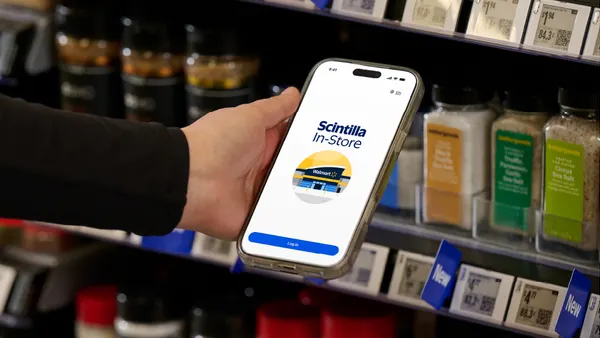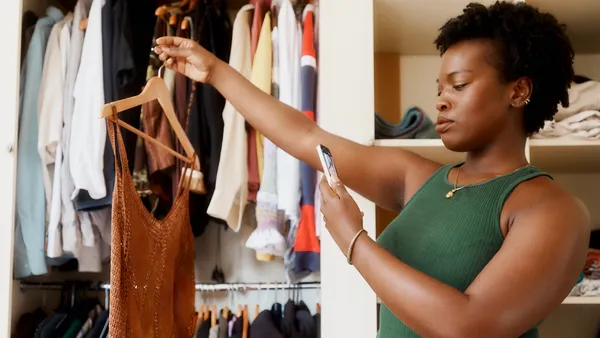Editor's note: To read our profile on Reebok, which covers its journey to No. 1 and where it's gone since then, click here.
Reebok's journey started long before it was acquired by Adidas. Its path from this point forward is now in the hands of Authentic Brands Group, as Adidas officially divests its one-time competitor.
Adidas is selling the company for about $2.5 billion, significantly less than the $3.8 billion it paid for Reebok in the early 2000s. Reebok is also a much smaller entity than it was when Adidas acquired it. In 2005, the year the Adidas acquisition was announced, Reebok made $3.77 billion. In 2020, Reebok made $1.61 billion.
The story of Reebok's stunning rise and slow decline is a long one, and far from straightforward. For a time, it felt like the brand was doing everything right: It hit on a key cultural moment with the aerobics boom and quite suddenly became one of the top sports brands. The company stayed in close competition with Adidas and Nike for years as it tried to break into spaces like basketball with The Pump. Reebok even signed Shaquille O'Neal, who remains a huge name in the basketball industry (and is an owner of Authentic Brands), and Allen Iverson, to broaden its reach.
"I'd completely forgotten about that, and to some degree, that's kind of part of the problem," Barbara Kahn, professor of marketing at the Wharton School, said of Reebok's years playing in the basketball market. "I live in Philadelphia and Allen Iverson was a huge star, and he was a supporter of Reebok. And I completely forgot that they actually were in that arena."
Decades later, Reebok is more squarely focused on the fitness market, a much smaller space than the sports world it used to operate in. Much of that is likely because Adidas operated in those same areas, making it necessary to differentiate between the two. Partially as a result of that refocusing, Reebok is now tens of billions of dollars smaller than Adidas and Nike, who it used to compete with directly. For the future, competing with the biggest brands shouldn't be the main focus, according to Neil Saunders, managing director of GlobalData.
"If, under Authentic Brands, Reebok focuses less on competing with Nike and more on developing a credible brand that can be offered via its various stores and other third-party retailers it should be able to build sales," Saunders said in emailed comments about the acquisition. "However, the market remains extremely competitive so coming up with a differentiated offer that has clear customer focus and a strong distribution strategy will be key to future success."
Life under Authentic Brands could mean a reentry into some of the sports it used to occupy, though the company stayed focused on Reebok's fitness positioning in its initial statement on the acquisition. Or it could mean more focus on Reebok's old hit shoes. Whatever path Reebok's new leadership takes, it has the benefit of building off of a well-known brand — just one that many have forgotten about over the years.
No one is in denial about the fact that Reebok is no longer a true competitor to the top players in the sports space. But some are hopeful that the sale will mean a new beginning for Reebok. And maybe, just maybe, the start of a very long road back to number one.
"Reebok needs to be authentically Reebok," Reebok President Matt O'Toole told Retail Dive earlier this year. "Over time, that's definitely possible. But it's a step-by-step process, and we've got a lot of rebuilding to do right now."
Key events in Reebok's rise and fall
-
1895
J.W. Foster and Sons, the precursor to Reebok, is founded.
-
1924
British runners Harold Abrahams and Eric Liddell win gold at the Olympics, wearing J.W. Foster shoes. They are later immortalized in the film Chariots of Fire.
-
1958
Joe and Jeff Foster found Reebok.
-
1970
Ron Hill wins the Boston Marathon wearing Reebok’s World 10 running shoe.
-
1979
Reebok lands five-star ratings from Runner’s World for three of its shoes: the Inca, the Midas and the Aztec
Paul Fireman takes a 95% stake in Reebok’s U.S. business.
-
1982
The Reebok Freestyle comes out, aiming to capitalize on the women’s aerobics trend.
-
1983
Reebok makes $12.8 million in net sales.
-
1984
Basketball legend Michael Jordan signs with Nike.
Joe Foster sells Reebok’s international business to Paul Fireman and investor Stephen Rubin.
Reebok makes $66 million in net sales.
-
1985
Reebok IPOs, listing 4 million common shares for $17 a share in July, followed by an additional 2.2 million shares the following April at $49 each.
Cybill Shepherd wears a pair of Freestyles to the Emmys and Mick Jagger wears them in a music video for “Dancing in the Street.”
Reebok makes $310 million in net sales.
-
1986
Reebok takes over No. 1 market share in U.S. shoe sales.
Reebok acquires Rockport for $118.5 million.
Reebok makes $920 million in net sales.
-
1987
Reebok acquires women-focused athletic shoe brand Avia for $180 million.
Reebok makes over $1 billion for the first time, netting $1.39 billion in net sales. Its net sales would never again fall under $1 billion.
-
1989
Reebok drops The Pump basketball shoe, making Reebok a “household name” in basketball.
Nike takes away Reebok’s title as the No. 1 seller of athletic shoes.
Joe Foster retires from Reebok.
-
1990
Reebok hits over $2 billion in net sales, with $2.16 billion total.
-
1991
Dee Brown wears The Pump when he wins the Slam Dunk Contest.
-
1992
Reebok signs a multi-year endorsement deal with Shaquille O’Neal.
With several members contracted to Nike, the Dream Team hides the Reebok logos on their Olympic awards ceremony uniforms, dealing a blow to Reebok.
Reebok debuts the vector logo, a departure from its use of the Union Jack flag.
The Greg Norman Collection, a subsidiary of Reebok, launches.
Reebok makes over $3 billion in net sales for the first time, raking in $3.02 billion.
-
1996
Reebok sells Avia.
Reebok strikes a footwear licensing deal with Ralph Lauren.
Reebok signs a 10-year deal with Allen Iverson.
-
2001
Reebok signs 10-year licensing deals with the NFL and NBA, replacing existing deals with Nike, Champion and Puma.
Reebok signs lifetime endorsement and marketing contract with Allen Iverson. (The retailer originally signed Iverson in 1996.)
-
2003
Reebok launches a signature shoe, the S. Carter, with Jay-Z.
Reebok debuts the G-Unit line with 50 Cent.
-
2004
Reebok inherits a deal with the NHL from its $329 million acquisition of The Hockey Company. It now has sports licensing deals with four major sports leagues in the U.S.: the NFL, NBA, NHL and MLB.
-
2005
Reebok sells Ralph Lauren Footwear for $110 million.
Adidas announces its intent to acquire Reebok for $3.8 billion, including Rockport and the hockey business, which then-CEO Herbert Hainer called the combination of “two of the most respected and well-known companies in the worldwide sporting goods industry.” The deal closes early in 2006.
-
2006
Adidas takes over Reebok’s previously negotiated 10-year deal with the NBA, signing a new 11-year contract with Adidas as the supplier.
Adidas sells the Greg Norman Collection to the MacGregor Golf Company.
-
2009
Reebok launches the EasyTone sneaker, focused on the women’s market.
-
2011
Reebok signs a 10-year licensing deal with CrossFit.
-
2012
Reebok loses NFL licensing contract to a host of other brands, including Nike, Under Armour and others.
-
2013
Returning to its ’80s roots, Reebok introduces a larger assortment in the studio and dance categories.
-
2015
Adidas sells Rockport for $280 million.
Reebok makes less than $2 billion for the first time since 1989, with $1.94 billion in net sales.
-
2017
Adidas takes over the NHL license from Reebok.
-
2019
Reebok reintroduces the Vector logo across the brand, bringing both performance and lifestyle segments under one logo.
-
2020
Reebok cuts ties with CrossFit after comments made by the CEO.
-
2021
In February, Adidas announces the divestiture of Reebok alongside its “Own the Game” strategy, with the “understanding that both Reebok and Adidas would better realize their growth potential independently of one another.”
In August, Adidas sells Reebok to Authentic Brands Group for around $2.5 billion.















